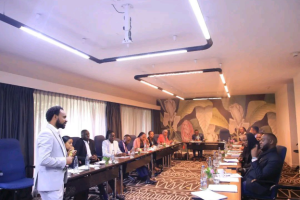
In contrast to earlier summits, Barbados Prime Minister Mia Amor Mottley is invited to deliver a speech at the 38th Heads of State and Government of the African Union Summit. She emphasizes throughout her speech the importance, strength, and worth of Adwa’s triumph in addressing today’s urgent problems, not just in Africa but globally as well.
“I stand here in the spirit of the battles of Adwa conscious that it was that battle within 24 hours that shook the confidence of the powers of Europe but inspired the people of Africa and the children of the African Diaspora that good would prevail over evil and light over darkness, but only in the context of our unity,” she said.
She added that “I stand here equally as a chair of the V-20; 70 countries around the world that are climate-vulnerable, 40% of whom come from this great continent of Africa.” We must work together to address our generation’s existential issue and the climate disaster. Indeed, while the globe grapples with the climate issue, the poorest among the poor remain the most vulnerable to floods, droughts, and hurricanes. As a result, working together in the spirit of Adwa is critical to mitigating climate change.”
In fact, her speech was true that the Adwa victory in 1896, when Ethiopian forces repelled the Italian army, is a watershed moment in African history that represents resistance, solidarity, and empowerment. Although the victory occurred a long time ago, its spirit and teachings are still relevant in dealing with current and recurring challenges and problems. Climate change and environmental threats, among other things, are pressing issues that necessitate unity, solidarity, and cooperation.
Furthermore, the spirit of Adwa is essential and can be applied in a variety of ways to solve climate change mitigation. For example, Adwa can teach the world about togetherness and collaborative action. It illustrates the strength that comes from unity.
In the context of climate change, African countries can band together, like they did during the struggle, to build coalitions and alliances that urge for collective action to address climate concerns. This cooperation can strengthen international negotiations and lead to more effective climate policy.
Above all, the victory at Adwa is a reminder of the strength of persistence and determination. This victory can serve as motivation for African people to take charge of their own destiny in the face of climate change. Local programs that support sustainable practices, such as community-led reforestation or renewable energy projects, can mirror this sense of empowerment. One example is Ethiopia’s Green Legacy initiatives, which inspire millions of people and plant over 40 billion tree seedlings.
Africa also possesses cultural pride and indigenous expertise on climate change mitigation. As a result, Adwa’s victory is a source of pride for many Africans, emphasizing the value of cultural identity. This pride can be used to promote indigenous knowledge and practices that support sustainable land management and biodiversity conservation. For example, the Konso people of Ethiopia are well-known for their innovative and sustainable land management strategies, which have enabled them to prosper in a harsh climate marked by steep terrain and scarce rainfall. Their farming practices are not only creative, but also inextricably linked to their cultural identity and social structures. Recognizing and respecting traditional ecological knowledge can improve Africa’s climate adaptation methods.
Adwa’s victory depends on strong leadership and advocacy. The leaders, particularly Emperor Menelik II of Ethiopia (1844-1913), who played crucial roles in the battle of Adwa, are well-known personalities in African history. Similarly, current leaders can draw on this mentality to push for climate mitigation, environmental protection, and sustainability.
They can motivate people to take action and mobilize resources for mitigation measures by leading programs such as Ethiopia’s green legacy program, which addresses climate change.
More importantly, Adwa’s narrative can serve as an effective instructional tool for raising awareness about climate change and its consequences. Africans can instill a feeling of responsibility and urgency for environmental challenges in future generations by teaching them about this historic achievement and its relevance to present conflicts. Furthermore, the victory of Adwa represents a significant achievement in terms of resistance against exploitation. Just as the victory at Adwa represented a rejection of colonialism and exploitation, the battle against climate change can be understood as a rejection of environmental degradation and corporate exploitation of natural resources. Advocating for equitable resource management and ecological protection can represent a spirit of resistance.
Africa presents practical examples of unity and solidarity. According to her, “We have examples of successful partnerships, not simply from Adwa’s spirit, conquests, and the rise of the Pan-Africanist movement in our past. However, during the COVID-19 pandemic, the Africa Union Under the leadership of then-President Cyril Ramaphosa, and with the assistance of Dr. Tedros of the WHO, who recognized that the Caribbean, which was being marginalized by denial of access to basic therapeutics, basic medical equipment, and vaccines, that we should not be left as Pariahs on the global landscape, but that our brothers and sisters in Africa, would bring us through the Africa Medical Supplies platform to be able to ensure that we could secure for our people
She further emphasized the importance of African solidarity, by saying, “It was with the solidarity of many of you in the African Union that the Bridgestone initiative was able to take root and make a case for a more modern and more equitable system that allows us to be able to access finance and to put in place measures that allow us to pause debt repayment during the subsequent period of necessity for rebuilding after horrific climatic events. We’ve seen how teamwork can benefit us. We don’t need any more evidence.”
In general, the victory at Adwa, in addition to uniting Ethiopians, served as an inspiration for other African countries to stand against colonial powers. Today, this attitude ought to promote global cooperation in combating climate change, motivating nations to assist one another in adopting sustainable practices and exchanging important technologies.
Therefore, by invoking the spirit of Adwa’s victory, African nations should strengthen their efforts to mitigate climate change, relying on themes of togetherness, resilience, empowerment, and cultural pride to produce a robust response to environmental protection, which is one of this time’s most critical issues.
BY EPHREM ANDARGACHEW
THE ETHIOPIAN HERALD SUNDAY EDITION 2 MARCH 2025



